

Internet History Sourcebooks Project. The kings of England had the right in feudal times of taking tolls on imports and exports.

As the taking of a share of the cargo was commuted into a money payment, it became customary to obtain a license at the Exchequer at a rate which became more or less fixed. Such payments were eventually regulated by Parliament. C.13. World History Timeline Russia History AD 979. Anarcho-primitivism. History[edit] Origins[edit] Anarchism started to have an ecological view mainly in the writings of American individualist anarchist and transcendentalist Henry David Thoreau.

The Descent of Man, and Selection in Relation to Sex. Darwin's background issues and concerns[edit] Charles Darwin's second book of theory involved many questions of Darwin's time.
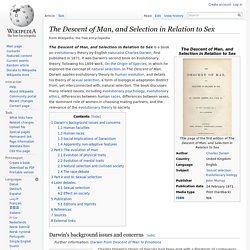
Charles Darwin's Origin of Species had been met with a firestorm of controversy in reaction to Darwin's theory, largely because it clearly implied that human beings were evolved from animals, contradicting the biblical story in the Book of Genesis. Historicization of History as Political Challenge and Existential Fate. Anita Lasker-Wallfisch: Music Amid the Memories of Horror. Anita Lasker-Wallfisch had arrived by normal train to Auschwitz in September of 1942, not in a cattle car.
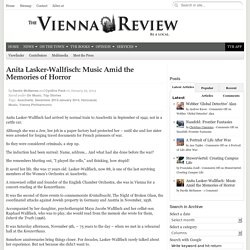
Although she was a Jew, her job in a paper factory had protected her – until she and her sister were arrested for forging travel documents for French prisoners of war. So they were considered criminals, a step up. The induction had been surreal: Name, address… And what had she done before the war? She remembers blurting out, “I played the cello,” and thinking, how stupid! It saved her life.
Puritan oligarchy? A look at the 1641 Body of Liberties. Posted on August 9, 2012.
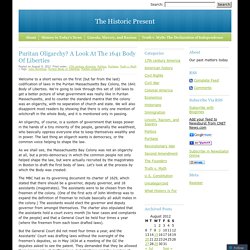
Ashlie Jensen on Pinterest. Log in Home Categories There’s more to see...

Sign up to discover and save different things to try in 2015. Ashlie Jensen Ashlie Jensen. Unavailable in your country. Historians of England in the Middle Ages. Historians of England in the Middle Ages helped to lay the groundwork for modern historical historiography, providing vital accounts of the early history of England, Wales and Normandy, its cultures, and revelations about the historians themselves.[1] The most remarkable period of historical writing was during the High Middle Ages in the twelfth and thirteenth centuries, when English chronicles produced works with a variety of interest, wealth of information and amplitude of range.
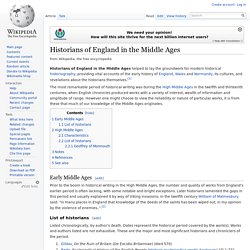
However one might choose to view the reliability or nature of particular works, it is from these that much of our knowledge of the Middle Ages originates. Early Middle Ages[edit] The Itinerary of John Leland the Antiquary: Published from the Original MS. in the Bodleian ... : John Leland. John Leland (antiquary) John Leland or Leyland (13 September, c. 1503 – 18 April 1552) was an English poet and antiquary.[2][3][4] Leland has been described as "the father of English local history and bibliography".[5] His Itinerary provided a unique source of observations and raw materials for many subsequent antiquaries, and introduced the county as the basic unit for studying the local history of England, an idea that has been influential ever since.
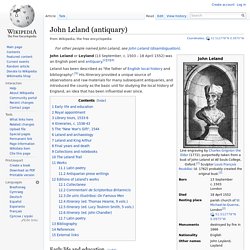
Between 1526 and 1528, Leland proceeded to Paris, studying along with many fellow expatriates, both English and German. His original plan to study in Italy, too, never succeeded.[2] Leland honed his skills at composing Latin poetry and sought the acquaintance of humanist scholars whom he much admired, such as Guillaume Budé and Jacques Lefèvre d'Étaples.
By 1529, Leland had returned to England. Who's Who in Medieval History and the Renaissance. The "Who's Who in Medieval History" project is intended to help you find information about significant individuals from the Middle Ages and Renaissance, when available, on the web and in print.
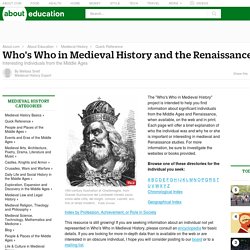
Each page will offer a brief explanation of who the individual was and why he or she is important or interesting in medieval and Renaissance studies. For more information, be sure to investigate the websites or books provided.
HISTORY OF BRITAIN, 407-597, by Fabio P. Barbieri. Aelle was remembered by the English, but had no prestigious descendants; this would be natural if Ambrosius had destroyed him as Geoffrey says.
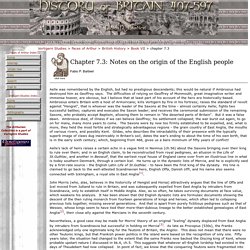
The difficulties of relying on Geoffrey of Monmouth, great imaginative writer and immense hoaxer, are obvious, but I believe that at least part of his account of the hero are historically-based. Ambrosius enters Britain with a host of Armoricans; kills Vortigern by fire in his fortress; raises the standard of revolt against "Hengist", that is whoever was the leader of the Saxons at the time - almost certainly Aelle; fights two successful battles; captures and executes the Saxon leader; and receives the ceremonial submission of the remaining Saxons, who probably accept Baptism, allowing them to remain in "the deserted parts of Britain".
But it was a false dawn. Ambrosius died, of illness if we can believe Geoffrey; his settlement collapsed; the war burst out again, to go on for many, many more years to come. HISTORY OF BRITAIN, 407-597, by Fabio P. Barbieri. The Gallic Chroniclers of 452 and 511. We have only a slim idea of the now-anonymous authors of these Gallic Chronicles, which are both named after the years of their final entries.
The Chronica Gallia a CCCCLII and the Chronica Gallia a DXI, as they are officially called, survive in a number of manuscripts, that all seem to originate from a ninth- or tenth-century Carolingian copy of the fifth- and sixth-century originals. Both authors’ names have been lost to us at least since that date. These chronicles seem to be products of a monastic establishment in southern Gaul (below). Google's Ngram Viewer Goes Wild. With the addition of wildcard search-term capabilities, Google's fabulous language-analysis tool gets even more powerful.
It's been nearly three years since Google rolled out its Ngram Viewer, allowing armchair historians to plot the trajectories of words and phrases over time based on an enormous corpus of data extracted from the Google Books digitization project. Since then, there have been numerous studies seeking to glean some cultural significance from the graphs of falling and rising word usage.
Features. Dr Ellie Pridgeon promoting the study of medieval wall paintings. Table of Contents — February 2013, 26 (1) At 96, Historian Lewis Reflects On 'A Century' Bernard Lewis is also the author of the best-selling What Went Wrong? Alan Kolc/ hide caption itoggle caption Alan Kolc/ Bernard Lewis is also the author of the best-selling What Went Wrong? Alan Kolc/ Over his long academic career, Bernard Lewis has arguably become the world's greatest historian of the Middle East. The linguist and scholar's career began before World War II, and in a new memoir he covers more than a few sensitive areas, from race and slavery in Islam, to the clash of civilizations and his long argument with scholar Edward Said, to his role as an adviser to former Vice President Dick Cheney. NPR's Neal Conan talks with Lewis about his new book, Notes on a Century. Interview Highlights On religious tolerance under Islamic rule "It is required by Islam. "In the first place, it doesn't apply to everybody.
Notes On A Century by Bernard Lewis: review. In the academic world, Bernard Lewis is well known as the most distinguished living historian of the Middle East. But in the more sensationalist corners of the American media, he is a darkly sinister figure. This quietly spoken, silver-haired British-Jewish academic, now in his 96th year, is apparently the intellectual Rasputin of the White House. Allegedly, Lewis was the person whose briefings persuaded George W Bush to go ahead with the invasion of Iraq. Decades before that, Professor Lewis had been described as the British spy who masterminded the Iranian Revolution: he organised it in order to weaken Russia, and thereby hasten the revival of British imperial rule in the Middle East.
This bizarre theory was invented by Lyndon LaRouche, the American fringe politician who also thinks that the Queen runs a worldwide criminal conspiracy. While many regard LaRouche as a badly cracked gramophone record, the same insight has not been applied to the late Edward Said. Bernard Lewis. Networks and Neighbours: Multiplicities of Being in the Early Medieval: Networks and Neighbours, II: Aspects of the Concept of the Roman Empire in the Early Middle Ages. Leopold von Ranke. History and the Supernatural in Medieval England - 9780511372612. Historical Writing in England: c. 500 to c. 1307 - Antonia Gransden. 10. An Age of Saints?: Power, Conflict and Dissent in Early Medieval Christianity. 01916599.2014.989677# Early Medieval Futures. Yesterday I met THE Peter Brown. Transactions of the Royal Historical Society - Abstract - EMPEROR OTTO III AND THE END OF TIME. Of Irminsuls and World Trees « Gangleri - articles. Extersteine: the quest for Germany’s roots.
Viking Sources in Translation: Homepage. Under construction. Ágrip af Nóregs konunga sögum [Abridgement of Norwegian kings' sagas], excerpt. (unavailable outside Yale) Alcuin, Letter to Higbald (unavailable outside Yale) al-Tartushi reports on his visit to Hedeby in the tenth century. Indiana University Digital Library Program. Mayke de Jong's new book, In Samuel's Image: Child Oblation in the Early Medieval West, offers both much more and a little less than the title indicates. A monograph about oblation, the act by which parents 'donated' their children to monasteries and other religious institutions, has every potential to be a dry and technical text of interest only to specialists. France in the Middle Ages. The Translations of Alfred and His Circle, and the Misappropriation of the Past - Malcolm Godden.
A Short History of the Executioner—Blog—The Appendix. Thomas Cromwell stood on the scaffold of Tower Hill. Blog—The Appendix. Contemporary History - Articles - Making History. The aim of contemporary history is to conceptualise, contextualise and historicise – to explain – some aspect of the recent past or to provide a historical understanding of current trends or developments. A Scientific Theology: Theory - Google Play. Foucault’s Order of Things diagram.
This is the diagram from Foucault’s The Order of Things. I couldn’t find it online, and wanted to use it in a talk. Michel Foucault: “What is an Author?” What is an Author? (1969) To read Michel Foucault, is to feel the grounds of one’s belief systems shift underneath one’s feet. The Angel of History — Fashion Plates and Fashion Satire Magic Transistor on Tumblr: Archive. The Poet, the Physician and the Birth of the Modern Vampire. The Public Domain Review. The Future Tense. Benjamin Breen. Ph.D. Candidate in History, University of Texas at Austin. Historiography in the Twentieth Century - Georg G Iggers - Bok (9780819567666) The Theory and Practice of History - Leopold Von Ranke, Georg G Iggers - Bok (9780415780322) The Secret of World History - Leopold Von Ranke, Roger Wines, Roger Wines - Bok (9780823210503) Studies: An Irish Quarterly Review, Vol. 63, No. 251 (Autumn, 1974), pp. 308-311.
Speculum, Vol. 51, No. 2 (Apr., 1976), pp. 357-359. Beryl Smalley. Reinventing Modern China: Imagination and Authenticity in Chinese Historical Writing. Acton, letter on historical integrity, 1887. Contemporary History - Articles - Making History. Jewish History, Vol. 11, No. 1 (Spring, 1997), pp. 7-40. Writing Backward: Modern Models in Historical Fiction. The Bulletin of Historical Research in Music Education, Vol. 19, No. 3 (May, 1998), pp. 207-214. Leopold von Ranke. Leopold von Ranke. The Bulletin of Historical Research in Music Education, Vol. 19, No. 3 (May, 1998), pp. 207-214. Preface: Reconsiderations of the Idea of Nostalgia in Contemporary Historical Writing. Leopold von Ranke.
Leopold von Ranke. History, Philosophy and Religion. History as Science, not only Art. (History for dummies, 2) The Secret of World History - Leopold Von Ranke, Roger Wines, Roger Wines - Bok (9780823210503) Theory and Practice of History - Leopold Von Ranke, Georg G Iggers - E-bok (9780203839195) New Directions in European Historiography - Georg G Iggers - Bok (9780819560711) A Global History of Modern Historiography - Georg G Iggers - Bok (9780582096066) Philosophical Reflections: Georg Wilhelm Friedrich Hegel. Grand Strategy: The View from Oregon. Nietzsche, Friedrich: Philosophy of History. History, Philosophy and Religion. History as Science, not only Art. (History for dummies, 2) History as Science, not only Art. (History for dummies, 2)
A Global History of Modern Historiography - Georg G Iggers - Bok (9780582096066)